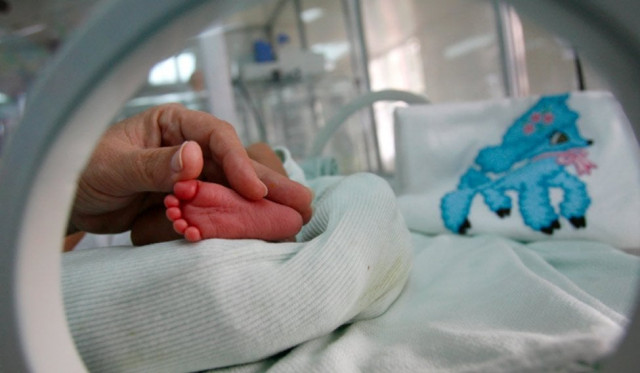K-P lags in implementing population caps
Despite pledging to increase contraceptive prevalence rate in 2012, K-P govt still struggling to achieve the target

PHOTO: REUTERS
Even though everyone started congratulating her, for Bakht Bibi, it was not good news at all. With multiple underlying health issues, she was not in a condition to give birth again.
But like thousands of Pakistani women, Bakht Bibi had no say in the matter.
“I always advised my husband to use contraceptives for family planning but he never paid heed to my suggestion, saying that doctors waste people’s time,” Bakht Bibi told The Express Tribune.
Unfulfilled promises
During the London Summit in 2012, the government of Pakistan pledged to bring the contraceptive prevalence rate (CPR) ratio up from 34 per cent to 55 per cent. Unable to achieve the target, the government once again promised to increase the CPR ratio in 2017. Unfortunately, however, no change has been witnessed up until now.
According to the last national census, the population of Pakistan has reached 220 million, while the population of Khyber-Pakhtunkhwa (K-P) currently stands at 30.52 million.
“The government promised to reach out to 120 million women and girls and educate them about family planning during the London Summit in 2012,” chief executive officer of Rehnuma Family Planning Association of Pakistan Syed Kamal Shah told The Express Tribune. “It ensured the optimal involvement of the public and private health sectors in family planning, and move towards the universal coverage of reproductive health services meeting the Sustainable Development Goals (SDG) target 3.7 by 2030. However, the promise could not be fulfilled.”
Syed Kamal Shah explained that to meet the target of increasing the CPR by 55 per cent, that the government will need to import contraceptives costing approximately $13 million each year, adding that the number will increase to $35 million annually by the end of 2020.
He revealed that a project named the Delivering Accelerated Family Planning in Pakistan – Public Sector Service Delivery (DAFPAK), in collaboration with the Population department KP, has been initiated to achieve the target and fulfil the commitment made by the government during the London Summit.
“The project will be initially started from District Swabi of K-P and will later be expanded to seven districts of the province to improve the infrastructure and further strengthen the skills of Lady Health Workers (LHWs) and other staffers working on family planning,” Kamal Shah said.
Fertility ratio higher in rural areas
Dr Farid from Palladium Group Pakistan, an international advisory that works with governments, businesses, and investors to solve the world’s most pressing challenges, said that according to the District Health Information System of Pakistan, the country’s fertility rate was 4.9 in 1991, while in 2007 it decreased to 4.1. Similarly, in 2013, the rate further reduced to 3.8. As of 2018, it further dropped to 3.6.
“The fertility ratio is higher in rural areas. According to the Pakistan Demographic and Health Survey (PDHS) report 2018, the fertility ratio in rural areas was 5.1 in 1991, while it was 4.5 in urban areas,” he said. “Similarly, in 2007, the ratio in rural areas was 4.5 while it was 3.3 in urban areas. In 2013, the ratio was 4.2 in rural areas, whereas it was 3.2 in urban areas. Likewise, in 2018, the ratio of fertility in rural areas was 3.9 while in urban areas, it was 2.9 %.”
Dr Farid added that Pakistan has, unfortunately, not been able to make the products of family planning locally as a result of which the country has to export these products.
“This year, the K-P government had no family planning products so much so that it had to borrow some from the Sindh government,” he revealed.
Future plans
The Special Assistant to K-P Chief Minister on Population Syed Ahmad Hussain Shah said that the provincial government will spend Rs20 million to control the population in the province.
“Per the directives of Islamic Council of Ideology (ICCI), a task force and committee has already been assigned to work for on population control. To this end, around 700 Family Care Centres have been established for the control of family planning, and the number of centres will be further increased soon,” he said.
Published in The Express Tribune, March 15th, 2020.













COMMENTS
Comments are moderated and generally will be posted if they are on-topic and not abusive.
For more information, please see our Comments FAQ